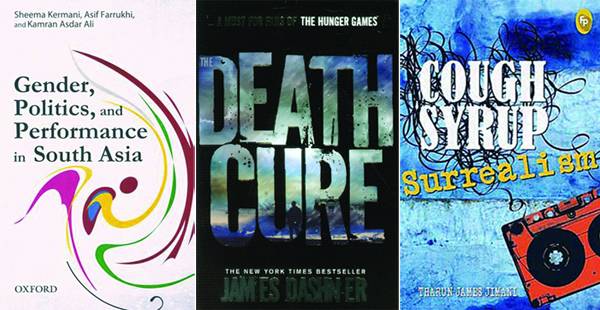
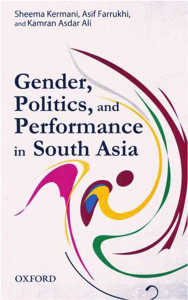
Gender, Politics, and Performance in South Asia
Sheema Kermani, Asif Farrukhi, and Kamran Asdar Ali
Oxford (hardback), 2015
PRs 1450
There have not been many studies conducted focusing on women’s issues in this region specifically. The essays by various contributors in this book make for a very interesting read for the general reader as well as scholars as it gives a variety of different looks at women in performing arts and the politics around them. The book will be a useful resource for libraries as well.
In Pakistan today, the scholarly challenge exists to represent the multiple layers of Pakistan’s history in order to bring the country out of the security studies/Islamic threat model that has become the paradigm within which Pakistan Studies are constantly placed.
The book has attempted to express various aspects of the social impact of the arts: It is through the arts that people express themselves; attain a sense of collective identity; and are able to reflect on their problems. Moreover, the arts elevate the mind and soul to a higher level and eradicate pettiness and coarseness. Culture brings people together and leads to harmony and cohesion. It counters violence and aggressive attitudes and urges people to reflect and think, thus, unleashing their creative energies. Through this exercise the contributors of this book have sought to address an important gap in the study of South Asia in general and Pakistan in particular. They explore the interconnections between performance arts and the politics of gender and class in South Asia within an historical framework and sociological research. The book demonstrates, how, within the South Asian milieu, the cultural forms such as theatre, dance, music, film, or the fine arts have been used to advocate for gender and class equity, women’s rights, and the rights of the marginalised. It explores how cultural forms and performances interrogate the constructions of identity, class, or religious affiliation in the South Asian context and provokes the reader to think beyond stereotypical representations of gendered experiences.
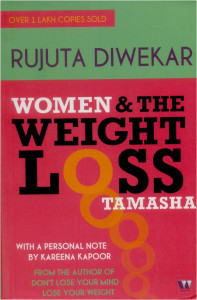
Women & The Weight Loss Tamasha
Rujuta Diwekar
Westland (paperback), 2015
PRs 450
This is a health and nutrition book from bestselling author Rujuta Diwekar. Bring back the tone in your body, the glow on your face and the sense in your head. Stop the weight loss tamasha. The nutritionist who taught us that simply eating (pun intended) is the key to a fab body is back with a comprehensive book on women, food and everything in between. From puberty to marriage, from pregnancy to menopause, Rujuta explains in detail the changes women go through and how what we do (or don’t) during these phases affects our overall well-being. Building on her four principles of eating right from Don’t Lose Your Mind, Lose Your Weight, she goes on to share her four strategies (Nutrition, Exercise, Sleep and Relationships) for each of these phases and especially the lifestyle disorders of PCOD, hypothyroid and diabetes. Rujuta, in her usual indomitable style, debunks (rubbishes rather) myths related to food, hormones and workouts, forces us to rethink our belief that pregnancy, menopause, hypothyroid, etc., come in the way of losing weight and reveals just how easy it is to remain healthy, strong and fit through one’s life. How different is this book from her first one. This book is different from her first in several ways. First, she concentrates solely on women as her subject. She covers issues and diet predicaments that are specific to women. She gives very specific advice on what girls/women can do to remain healthy/strong in each phase of their life. Her chapter on lifestyle disorders is extensive as we now know, PCOD and hypothyroid have become rampant and there is no information out there for Indian women on why these disorders affect us and how simple changes in diet, exercise can make such a difference.
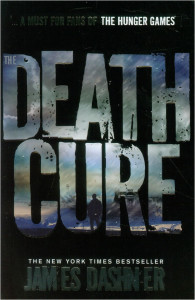
The Death Cure
James Dashner
Chicken House (paperback), 2013
PRs 795
Read the third book in the #1 New York Times bestselling Maze Runner series, perfect for fans of The Hunger Games and Divergent. The first and second books, The Maze Runner and The Scorch Trials, are now major motion pictures.
WICKED has taken everything from Thomas: his life, his memories, and now his only friends—the Gladers. But it’s finally over. The trials are complete, after one final test.
Will anyone survive?
What WICKED doesn’t know is that Thomas remembers far more than they think. And it’s enough to prove that he can’t believe a word of what they say.
The truth will be terrifying.
Thomas beat the Maze. He survived the Scorch. He’ll risk anything to save his friends. But the truth might be what ends it all.
The time for lies is over.
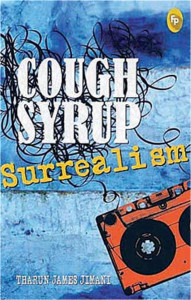
Cough Syrup Surrealism
Tharun James Jimani
Prakash Book Depot (paperback), 2013
PRs 495
“Charlie’s not a depressive. He’s certainly not suicidal; the boy’s too big a coward to even cut himself while shaving. He may be delusional, he may sincerely wish that he were depressed, but he’s certainly not a depressive.”
That’s Mao; nobody listens to him. But that’s probably because he’s a figment of Charlie’s imagination.
An unwitting Charlie – rudely interrupted in the middle of typing out his umpteenth suicidal note – is hurled into a brace new world of addiction, rock music, and debauchery in this tale of growing up and going down. From rolling joints to rolling in drug money, from backing out of life to fronting somebody else’s rock band, he’s in for a bumpy ride. Charlie divides his time between being in love with Paloma and hating himself, between living out Nineties music video fantasies and wishing he were someone else.
The problem is it’s 2006 and MTV is not Music Television anymore. Mixtapes are passé, self-loathing is cliché, and Charlie’s world is fast deteriorating into caricature. At the end, Charlie is forced to figure out which one of his many lives he really wants for himself.
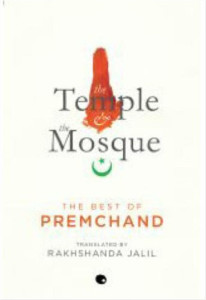
The Temple and the Mosque
Premchand
Harper Perennial (paperback), 2011
PRs 500
Premchand’s fiction has been translated before, but seldom have these translations revealed the many facets of this literary genius, nor have they displayed the wide variety of ‘types’ he was capable of portraying.
Premchand wrote not only about villains and martyrs, poverty and inequality, a rigid social order and caste disparities; his world, black-and-white though it might appear, was also lit by flashes of sotto voce humour and gentle irony.
While all of Premchand’s favourite characters – bhang-drinking pandits, miserable sweepers and arrogant Thakurs – feature in this collection, this is perhaps the first time that the English reader will be introduced to his ‘other’ world too: a world of unbelievably good men, lovesick young girls and a penniless braggart’s self-delusion.
From simple village tales to insightful glimpses into the human heart, this eclectic collection shows why, even seventy years after his death, Premchand’s work continues to be relevant to our lives.

